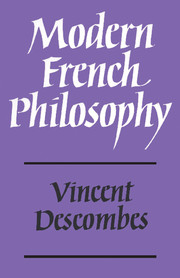Book contents
- Frontmatter
- Contents
- Foreword by Alan Montefiore
- Note on abbreviations and translation
- Introduction: Philosophy in France
- 1 The humanisation of nothingness (Kojève)
- 2 The human origin of truth (Merleau-Ponty)
- 3 Semiology
- 4 The critique of history (Foucault, Althusser)
- 5 Difference (Derrida, Deleuze)
- 6 The end of time (Deleuze, Klossowski, Lyotard)
- Index
6 - The end of time (Deleuze, Klossowski, Lyotard)
Published online by Cambridge University Press: 05 June 2012
- Frontmatter
- Contents
- Foreword by Alan Montefiore
- Note on abbreviations and translation
- Introduction: Philosophy in France
- 1 The humanisation of nothingness (Kojève)
- 2 The human origin of truth (Merleau-Ponty)
- 3 Semiology
- 4 The critique of history (Foucault, Althusser)
- 5 Difference (Derrida, Deleuze)
- 6 The end of time (Deleuze, Klossowski, Lyotard)
- Index
Summary
The recent orientation of the debate in France is a delayed effect of the experience of May 68, a month in which the French educated classes had the surprise of their lives. The revolution which had been spoken of for so long was triggered off without warning. Yet perhaps this revolution was not a revolution after all … For more than twenty years, intellectuals had made great efforts to instruct themselves in historical materialism, hoping to break away from the ‘petty bourgeois ideology’ of their origins. Now they discovered in this theory of history, in this political mode of thought, the obstacle that separated them from history at the very moment when history was knocking on the door.
Authority
During May and June of that year, a thorough acquaintance with power was made, in the sense that everybody saw in the course of the famous ‘events’ the two contradictory features of authority: an extreme fragility combined with an unlimited capacity for resisting subversion. The fragility of authority: student unrest was enough to provoke general turmoil and to paralyse an entire nation. It became apparent that the authorities could successfully oppose a coup d'éat such as the putsch of Algiers in 1961, but not a carnival. Authority ensures that it is obeyed only if everyone is convinced that it is the authority. Although power can be endlessly defined as the deployment of a panoply of means for control and coercion, it remains true that the authority of this power, its capacity to employ such means, resides in its legitimacy, that is, in public opinion.
- Type
- Chapter
- Information
- Modern French Philosophy , pp. 168 - 190Publisher: Cambridge University PressPrint publication year: 1981



